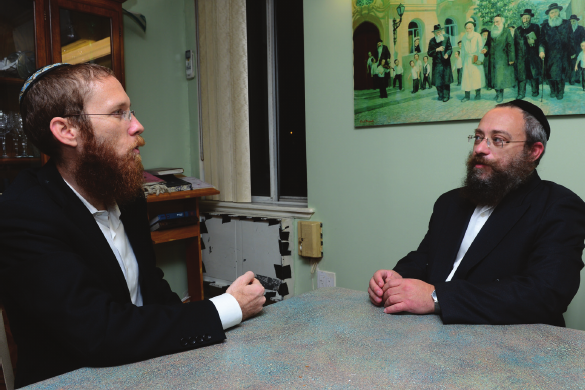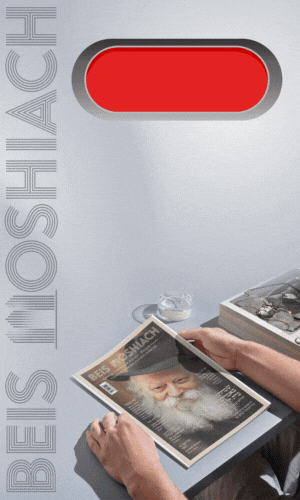Keeping the Dancing Going Until Dawn
“Whoever did not see the Simchas Beis HaShoeiva in Crown Heights, never saw simcha in his life.” Shraga Crombie spoke with the man at the keyboard, R’ Yossi Cohen, who has been playing every night of Sukkos for twenty-five years • Full Story
People know already, “Whoever did not see the Simchas Beis HaShoeiva in Crown Heights, never saw simcha in his life.” * Shraga Crombie spoke with the man at the keyboard, R’ Yossi Cohen, who has been playing every night of Sukkos for twenty-five years. * About the first time, and about the unforgettable moments when he played in front of the Rebbe in 5753 and 5754.
“I’m going to sleep until Yossi Cohen. Wake me up at two, please.”
If that sounds strange to you, then I guess you haven’t been (at least in recent years) at the Simchas Beis HaShoeiva in Crown Heights. For thousands of Chassidim, this request is most reasonable. They go to sleep early, while the big band plays, and wake up at two in the morning when the band is replaced by one man: Yossi Cohen.
From the moment he gets up on the stage, they don’t miss a minute. They dance joyously to his singing and playing until six in the morning and that’s only because the police come and open the street to traffic again.
But there is one person who doesn’t go to sleep until Yossi Cohen, and that is Yossi Cohen himself. He plays starting at eight o’clock at the Simchas Beis HaShoeiva in Boro Park. When he finishes at twelve, he goes to Crown Heights where he stops at home to wake up his children and the guests who asked to be woken at two.
I wanted to meet with Yossi and hear from him what it’s like to play for the thousands of people who come to the Rebbe for Tishrei, from which they derive simcha for the entire year.
How do you have the strength to play all night, night after night?
When I think about it, I’m also amazed. It’s hard work that demands a lot of energy. It’s not easy being up all night on your feet It’s definitely not easy doing this night after night, but here it’s different since I get kochos from the Rebbe. I have no other explanation for it. Although I don’t understand it, I feel the kochos flowing into me one hour after another, one night after another.
Let’s go back a bit. How did you become a musician?
Divine providence is wondrous. When I was nine, I stayed home one day since I didn’t feel well. My aunt watched me. She spent the time with her daughter who played a melody which I found fascinating. I asked to try it. She let me try and I asked her to teach me a song. She taught me “Ki M’Tziyon.” That was the first song I learned and I could immediately see that I had a talent for music.
The next step was trying my mother’s accordion. She has a talent for music but did not develop it and her accordion wasn’t much in use until I started playing it. I continued to improve on the accordion, but in the years to come playing music wasn’t more than a hobby I did in my free time.
When I was in yeshiva, I would play music with friends. One bachur, who had a talent for chazanus, would sing, and I would accompany him. When we went to army bases on mivtzaim or to Evenings with Chabad, I would play Chabad tunes on the keyboard.
Did you study music?
I was given a great gift from G-d, a developed talent for music. I never took lessons, not as a child and not when I turned professional. Whatever I know, including notes, is self-taught, and boruch Hashem, I see that it’s better than anything I could have learned from others.
So how does a bachur who plays as a hobby, become a famous musician?
For a short while after I got married, I still played only as a hobby or on mivtzaim, mainly for the shliach in Queens, R’ Shraga Zalmanov. In those days, he did many Evenings with Chabad for Israelis and I played for them. I remember one time we did a Chanuka party at a radio station and I played “HaNeiros Halalu” and other holiday songs. Boruch Hashem, it was very successful.
I did not think about a career in music and I started a business in which I invested a lot of money. Unfortunately, it failed and I lost all my money and even more than that. I had no idea “from where my help would come,” until my wife suggested I become a one-man band. She said G-d gave me a talent and it was time to use it. I was nervous since I had no real experience in playing beyond what I did on mivtzaim, but I had nothing to lose and I put an ad in the Jewish Press.
I got a phone call from someone asking whether I could play at a sheva brachos and of course I said yes. It didn’t seem too challenging. Then he asked me whether I could sing too. The problem was that I had never sung and played simultaneously and I was nervous, but I took the job and was happy that there were a few months to go until the event. Boruch Hashem, I was successful and everyone was pleased. From then on, my name got around by word of mouth and I got more and more requests for events. From sheva brachos it turned into weddings and I became a one-man band.
So it’s thanks to your wife…
For sure. Not only for encouraging me to develop my musical career, but also for dealing with the work at home. It’s not easy when your husband is out of the house nearly every evening and you are left alone to handle the children.
But the truth is that it’s more than that. Here is an anecdote that shows what a sacrifice my wife makes. Ten years ago, I had a job playing at a wedding in Boro Park on a snowy night. In the afternoon, I went with my wife, who was in labor, to the hospital. Time passed and she still had not given birth. I was very concerned since I knew that at seven o’clock I had a wedding to play at. I had tried to find someone to replace me but was unsuccessful. I didn’t know which was worse – to leave my wife in the hospital without me or a wedding without a musician.
My wife maintained that I had to go bring joy to the bride and groom and the merit of the mitzva would help her in giving birth. The Jewish doctor there said that if this is what she wants, I should go to the wedding and right after she gave birth he would call and update me. That’s what we did. A few minutes after the bride and groom went out to the dance floor, I got a phone call from the doctor telling me about the birth of my son. The simcha that night was double.
Why would a Lubavitcher musician be asked to play for a wedding that is not Chabad?
Not only is it not surprising, it’s very appropriate; and not only a Lubavitcher musician but Chabad niggunim! All groups know that Chabad niggunim are pure simcha and when you want a special simcha and not something empty, vacuous, then you request Chabad niggunim.
A number of years ago, there was a wedding in Crown Heights of a couple who became interested in Chabad through Heichal Menachem in Boro Park. They came from well-known Satmar families. Before the wedding, the couple told me that they wanted Chabad niggunim at their wedding and no niggunim from other Chassidic groups, even if relatives asked for it. That made me a little nervous since I knew that many distinguished rabbis would be attending, but I promised to do as they said.
There were hundreds of guests wearing shtreimlach and I put in my best effort. The simcha was tremendous and I got a lot of positive feedback.
A few weeks later, I got a phone call from someone in Monroe who said he was at that wedding and he was making a bar mitzva for his son which would be attended by the Satmar Rebbe. He wanted me to play at the bar mitzva but only Chabad niggunim. I asked him if he was crazy. How could I play only Chabad niggunim in Monroe in the Satmar Rebbe’s presence? But he said this is what he wants and that is what I did. There too, the simcha was exceptional. Everyone danced and sang with great liveliness.
How did you become the official musician for the Simchas Beis HaShoeiva?
Simchas Beis HaShoeiva out on the street began on Sukkos 5741/1980 when the Rebbe spoke about it in a sicha. A few years later I saw that when it got late, the musicians were all tired. I spoke with Yisroel Shemtov who arranged the festivities and offered to replace them and play alone. He was hesitant. Back then, the one-man band hadn’t taken off yet and he wasn’t convinced that I with my keyboard could replace a band and be able to hold the crowd. In the end he was willing to give me a one night trial. The rest is history.
For me, the Simchas Beis HaShoeiva lasts all year, both because I take kochos and simcha from it for the rest of the year, and because I get feedback wherever I go. At weddings in frum neighborhoods, little kids come over to me and ask me whether I am the musician from the Simchas Beis HaShoeiva. People on the street stop me and thank me for the great simcha during the dancing on those nights of Yom Tov.
Unlike weddings and other events when I plan what I will play, at the Simchas Beis HaShoeiva I don’t plan or prepare. I feel that the ones who decide what I should play is the crowd itself and I just go with that. Sometimes, they tell me there is a certain niggun that I always play towards morning. But I never noticed that; it just happened naturally. I see the joy of the crowd increasing as time moves on. I see the bachurim dancing on and on, nonstop, and my fingers find the right keys and the right niggunim that will keep them going.
I know and feel that I am only a channel, and my job is to do what I can, but the great simcha is something from heaven. For me, it’s a great z’chus to give such nachas to the Rebbe.
What was the highest point in your musical career?
No question, the highest point was when I played for the Rebbe, when the Rebbe came out on the balcony after Mincha in 5753 and 5754, and I would play Yechi with the Rebbe encouraging the singing.
How did you get that z’chus?
In 5752, when the Rebbe spoke about an increase in simcha and doing away with undesirable things with sixty days of joy, R’ Kuti Rapp a”h arranged dancing every night in 770. He asked me to play. I was happy to do so, and any night that I did not have a wedding or other event, I played in 770. On nights I could not show up, I found replacements. That is how there came to be a rotation among musicians. When the Rebbe started going out on the balcony in 5753, we continued the rotation of musicians with someone else playing every day in front of the Rebbe.
It was a huge z’chus and it was obvious that the Rebbe had nachas from it. When the Rebbe motioned with his hand to increase the singing, I had to increase the speed of my playing since the crowd sang Yechi faster and faster, over and over, as you can see on the videos of those days.
Those moments are etched in my mind forever, how the Rebbe encouraged the singing and the crowd had emuna shleima that the Rebbe was about to reveal himself and the Geula was beginning.
Today I pray that I merit this once again, to play at the true and complete Geula and to see the Rebbe encouraging the singing with both his hands.
Amen.
354
Join ChabadInfo's News Roundup and alerts for the HOTTEST Chabad news and updates!










































